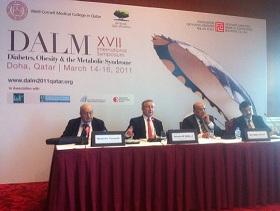Using AI to control energy for indoor agriculture
30 September 2024
Published online 14 March 2011

More than 650 scientists and healthcare practitioners have gathered in Doha, Qatar, for the XVII International Drugs Affecting Lipid Metabolism Symposium (DALM2011), held for the first time outside Italy or the United States.
This year's symposium, taking place 14–16 March 2011, will focus on the latest research on the causes, control and treatment of diabetes, obesity and metabolic syndrome. Over 100 scientific abstracts were submitted to the symposium.
Diabetes is one of the most serious healthcare challenges in the Middle East. In the United Arab Emirates, for example, over 18% of the population has the disease. A 1999 survey found that 15% of the Qatari population had diabetes, while an additional 11% were diagnosed with impaired glucose tolerance. The disease accounts for more than 10% of the small country's healthcare expenditure.
Metabolic syndrome in adults over 50 years of age is also quite high, reaching 52% across the Middle East1.
"Science research in biology is large and wide, but the focus of this conference on one of the most important group of diseases that plague this region makes it especially important, not just for Qatar but for the wider region. says Mohamed Fathy Saoud, president of Qatar Foundation for Education, Science and Community Development, who is co-sponsoring the symposium along with the Giovanni Lorenzini Medical Foundation in Milan, Italy.
"That is why I hope the discussions and papers presented during this conference will act as steps forward for us on how to address and treat these syndromes."
"Diabetes and obesity will continue to contribute to deaths from metabolic disease for many years unless we do something about it now," says Antonio Gotto, dean of Weill Cornell Medical College in New York and co-chair of the conference.
Weill Cornell Medical College in Qatar, the country's first medical school, is the co-sponsor of the conference. Javaid Sheikh, dean of Weill Cornell Medical College in Qatar, stressed the importance of education and investment in basic research as well as clinical trials to address the challenge of diabetes in the region.
"[Metabolic disorders] need what we call a multi-faceted aim. This means we cannot imagine that one direction into scientific research or two would be enough to address these syndromes. That is why there are tens of thousands of researchers working on this, each of them starting from their own platform," said Saoud.
The scientific papers due to be presented throughout the conference discuss diverse aspects of metabolic syndromes, ranging from novel risk factors and genetics origins to lifestyle and dietary recommendations for patients.
doi:10.1038/nmiddleeast.2011.33
Stay connected: